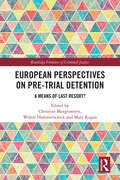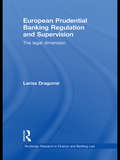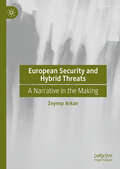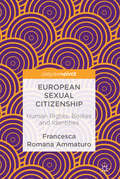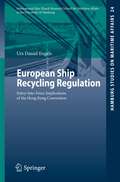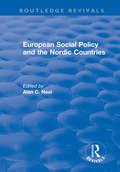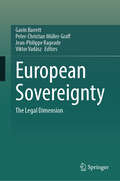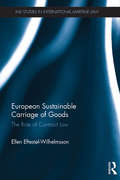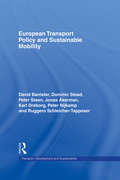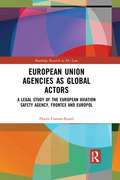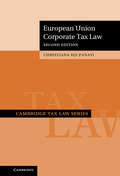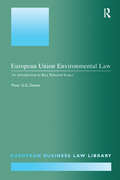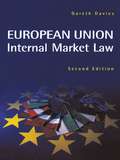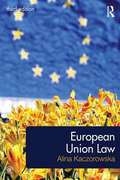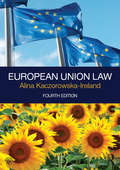- Table View
- List View
European Perspectives on Pre-Trial Detention: A Means of Last Resort? (Routledge Frontiers of Criminal Justice)
by Mary Rogan Christine Morgenstern Walter HammerschickHigh levels of remand or pre-trial detention (PTD) is a matter of growing concern in many countries, and at a European level. Despite being responsible for a significant part of the prison population, PTD practice is rarely the focus of criminological and criminal justice research. This book examines pre-trial detention practices and different ways of reducing its use across Europe. Offering a range of country-specific studies, this book also offers comparative studies of major issues across the continent. In particular, this book illustrates and examines how the actors (judges, public prosecutors, defence lawyers) work in pre-trial proceedings and make decisions; the common challenges in PTD decision-making; the factors which explain higher and lower rates of PTD across Europe; similarities and differences in practice; and the ways in which cross-border cases within the European influence policy and practice. Offering suggestions and recommendations for how to bring down the use of PTD in Europe, this book is essential reading for all those engaged with European penal research and practice.
European Prudential Banking Regulation and Supervision: The Legal Dimension (Routledge Research in Finance and Banking Law)
by Larisa DragomirThe financial market events in 2007-2009 have spurred renewed interest and controversy in debates regarding financial regulation and supervision. This book takes stock of the developments in EU legislation, case law and institutional structures with regards to banking regulation and supervision, which preceded and followed the recent financial crisis. It does not merely provide an update, but anchors these developments into the broader EU law context, challenging past paradigms and anticipating possible developments. The author provides a systematic analysis of the interactions between the content of prudential rules and the mechanisms behind their production and application European Prudential Banking Regulation and Supervision includes discussions of the European banking market structure and of regulatory theory that both aim to circumscribe prudential concerns. It scrutinises the content of prudential norms, proposes a qualification of these norms and an assessment of their interaction with other types of norms (corporate, auditing and accounting, consumer protection, competition rules). It also features an analysis of the underpinning institutional set-up and its envisaged reforms, focusing on the typical EU concerns related to checks and balances. Finally, the book attempts to revive the debate on supervisory liability, in light of the developments discussed. This book will be of great value to all those interested in financial stability matters (practitioners, policy-makers, students, academics), as well as to EU law scholars.
European Real Estate: Asset Class Performance and Optimal Portfolio Construction
by Gianluca Mattarocci Dilek PekdemirEuropean Real Estate.
European Regulation of Medical Devices and Pharmaceuticals
by Nupur ChowdhuryOne of the primary functions of law is to ensure that the legal structure governing all social relations is predictable, coherent, consistent and applicable. Taken together, these characteristics of law are referred to as legal certainty. In traditional approaches to legal certainty, law is regarded as a hierarchical system of rules characterized by stability, clarity, uniformity, calculable enforcement, publicity and predictability. However, the current reality is that national legal systems no longer operate in isolation, but within a multilevel legal order, wherein norms created at both the international and regional level are directly applicable to national legal systems. Also, norm creation is no longer the exclusive prerogative of public officials of the state: private actors have an increasing influence on norm creation as well. Social scientists have referred to this phenomenon of interacting and overlapping competences as multilevel governance. Only recently have legal scholars focused attention on the increasing interconnectedness (and therefore the concomitant loss of primacy of national legal orders) between the global, European and national regulatory spheres through the concept of multilevel regulation. In this project the author uses multilevel regulation as a term to characterize a regulatory space in which the process of rule making, rule enforcement and rule adjudication (the regulatory lifecycle) is dispersed across more than one administrative or territorial level and amongst several different actors, both public and private. The author draws on the concept of a regulatory space, using it as a framing device to differentiate between specific aspects of policy fields. The relationship between actors in such a space is non-hierarchical and they may be independent of each other. The lack of central ordering of the regulatory lifecycle within this regulatory space is the most important feature of such a space. The implications of multilevel regulation for the notion of legal certainty have attracted limited attention from scholars and the demand for legal certainty in regulatory practice is still a puzzle. The book explores the idea of legal certainty in terms of the perceptions and expectations of regulatees in the context of medical products - specifically, pharmaceuticals and medical devices, which can be differentiated as two regulatory spaces and therefore form two case studies. As an exploratory project, the book necessarily explores new territory in terms of investigating legal certainty first in terms of regulatee perceptions and expectations and second, because it studies it in the context of multilevel regulation.
European Security and Hybrid Threats: A Narrative in the Making
by Zeynep ArkanHybrid threats have been defined in various ways by different security actors, with their scope continuously expanding to encompass emerging insecurities within the evolving security environment. As an umbrella term encompassing a wide spectrum of threats with complex and multidimensional features, the notion of hybrid threats remains inherently vague and amorphous. This lack of clarity presents significant challenges for policymakers, who must constantly identify potential dangers, anticipate risks, and formulate effective responses to safeguard their polities and populations. Consequently, a persistent sense of insecurity has become a defining characteristic of the current European security landscape. This &‘new normal&’ of European security is characterised by a series of &‘(un)known unknowns&’ that fall under the elusive concept of hybrid threats. However, rather than accepting this evolving security paradigm at face value, this study calls for a critical examination of its underlying assumptions, core concepts, and broader political implications. It argues that the hybrid threat narrative demands a re-evaluation of what security means in contemporary Europe and how it is operationalised. Moreover, the study underscores the expansive nature of the hybrid threat framework, which has the potential to include virtually any domain – ranging from education and technology to research and public infrastructure – thereby contributing to the securitisation of all aspects of social and political life. This expansive and ambiguous framing raises important questions about the limits of security and allocation of resources, carrying considerable implications for democratic governance in Europe. Dr Zeynep Arkan<span lang="EN-GB" style="font-size: 11.0pt; mso-ascii-font-family: Calibri; mso-ascii-theme-font: minor-latin; mso-fareast-font-family: 'Times New Roman'; mso-hansi-font-family: Calibri; mso-hansi-theme-font: minor-latin; mso-bidi-font-family: Calibri; mso-bidi-theme-font: minor-latin; color: #1f3864; mso-themecolor: accent1; mso-themeshade: 128; mso-ansi-language
European Sexual Citizenship: Human Rights, Bodies and Identities
by Francesca Romana AmmaturoThis book is an innovative and critical contribution to the study of the human rights of lesbian, gay, bisexual, transgender, intersex and queer (LGBTIQ) people in the context of Europe. Combining legal and Foucauldian approaches, it investigates the ways in which current discourses about LGBTIQ rights in Europe are tightly bound to contemporary debates about national and trans-national citizenship. The author defines and analyzes the concept of 'multisexual citizenship' to illustrate new, flexible forms of sexual and gendered citizenship that could radically transform practices of citizenship and the current human rights framework in Europe. She does this by combining critical deconstructions of the case law of the European Court of Human Rights with ethnographic observations and sociological analysis. This interdisciplinary work will appeal to sociologists, lawyers and researchers of gender and LGBTIQ rights.
European Ship Recycling Regulation
by Urs Daniel EngelsThis study provides an in-depth analysis of the Hong Kong Ship Recycling Convention as adopted in May 2009 and a thorough analysis of the overall status quo of ship recycling regulations. It investigates the lack of sufficient ratifications of the Convention from both a legal and an economic perspective. The first part of the study focuses on the history of the Convention's entry-into-force provision and the rationale behind it. Due to the fact that this provision provides a considerable additional obstacle to the Convention's becoming legally binding, in the second part the focus of the work shifts to unilateral action in this field. An overview of the legal environment of European ship recycling legislation is followed by an analysis and evaluation of a number of proposals by the European Commission attempting to tackle the problems of current ship recycling procedures. With a particular emphasis on (planned) European measures in this regard, the analysis' overall message is one of cautious optimism.
European Social Policy and the Nordic Countries
by Alan C. NealThis title was first published in 2000: The contributions to this volume have been brought together and edited from presentations made to a two-day seminar held in Brussels with the financial and organisational support of the social affairs directorate of the European Commission on 15th and 16th May 1995. That seminar provided an important first opportunity, following accession to membership of the European Community by Finland and Sweden, for representatives of the Commission to discuss with delegates from all of the significant labour market organisations throughout the Nordic countries some of the challenges and fears raised by the superimposition of a European-level framework upon the fabled social structures of those Nordic countries.
European Societies, Migration, and the Law: The ‘Others' amongst ‘Us'
by Moritz JesseNot a day passes without political discussion of immigration. Reception of immigrants, their treatment, strategies seeing to their inclusion, management of migration flows, limitation of their numbers, the selection of immigrants; all are ongoing dialogues. European Societies, Migration, and the Law shows that immigrants, regardless of their individual status, their different backgrounds, or their different histories and motivations to move across borders, are often seen as 'the other' to the imaginary society of nationals making up the receiving (nation-)states. This book provides insights into this issue of 'othering' in the field of immigration and asylum law and policy in Europe. It provides an introduction to the mechanisms of 'othering' and reveals strategies and philosophies which lead to the 'othering' of immigrants. It exposes the tools applied in the implementation and application of legislation that separate, deliberately or not, immigrants from the receiving society.
European Sovereignty: The Legal Dimension
by Gavin Barrett Jean-Philippe Rageade Peter-Christian Müller-Graff Viktor VadászIn October 2022, the Academy of European Law (ERA) in Trier celebrated its 30th anniversary with a congress devoted to the legal dimension of the European sovereignty. 1992 was not only the year in which the ERA was founded, but also a key moment in the history of European integration, as it marked the signing of the founding treaty of the European Union, the Treaty of Maastricht. While sovereignty was a highly controversial issue at the time, the (geo)political and economic challenges facing the Union in recent years have brought it back to the centre of the debate. This book brings together some of the papers presented at the Jubilee Congress and explores recent concepts such as 'budgetary sovereignty', 'strategic sovereignty', and 'digital sovereignty'.
European Sports Law
by Stephen WeatherillEuropean Sports Law: Collected Papers 2nd edition contains the collected works (1989-2012) of Stephen Weatherill, Jacques Delors Professor of European Community Law, Somerville College, University of Oxford, United Kingdom, with an extensive introduction on the background and rationale for the selected papers. Stephen Weatherill is a leading academic and author on the subject of European Union law and professional sport. His work is of the highest academic standard and practice-oriented at the same time, which has a strong impact on major court cases and the development of international sports law in general. The updated 2nd edition is a vademecum for those involved with international sport and the challenges European law and sport provide and is an indispensable tool for administrators, managers, researchers, academics, marketers, broadcasters, advisers and practitioners. The book appears in the ASSER International Sports Law Series (ISSN: 1874-6926), under the editorship of Dr. David McArdle, Dr. Ben Van Rompuy and Marco van der Harst LL. M.
European States and Their Muslim Citizens
by John R. Bowen John R. Bowen Christophe Bertossi Jan Willem Duyvendak Mona Lena Krook Christophe Bertossi Jan Willem DuyvendakThis book responds to the often loud debates about the place of Muslims in Western Europe by proposing an analysis based in institutions, including schools, courts, hospitals, the military, electoral politics, the labor market, and civic education courses. The contributors consider the way people draw on practical schemas regarding others in their midst who are often categorized as Muslims. Chapters based on fieldwork and policy analysis across several countries examine how people interact in their everyday work lives, where they construct moral boundaries, and how they formulate policies concerning tolerable diversity, immigration, discrimination, and political representation. Rather than assuming that each country has its own national ideology that explains such interactions, contributors trace diverse pathways along which institutions complicate or disrupt allegedly consistent national ideologies. These studies shed light on how Muslims encounter particular faces and facets of the state as they go about their lives, seeking help and legitimacy as new citizens of a fast-changing Europe.
European Sustainable Carriage of Goods: The Role of Contract Law (IMLI Studies in International Maritime Law)
by Ellen Eftestøl-WilhelmssonThis work discusses the rapidly developing European transport policy on sustainable freight and the connected efforts initiated by the European Commission (EC) on greening transport by the means of contract law. Greening transport has been a central goal for the EU for decades. The main problem has been, and still is, that far too much carriage of goods within the EU is performed unimodally: by road carriage alone. This has caused severe problems particularly in central Europe, where both trade and environment is suffering from an ineffective transport industry with growing problems of congestion and pollution. A modal shift in transport from mainly road based to a form of transport in which more environmental friendly modes such as rail, inland waterways and sea born transport are integrated into one transport chain, is hence an objective of the EU. If successful, this model could then be extended to the international transport community. The key question raised in this book is whether the traditional role of contract law is changing to such an extent that the parties involved must take external interests into account. In the case of the EU’s efforts to enhance sustainable carriage of goods within its realm, the author explores whether governmental interference is necessary, or if we can trust that the parties will integrate environmental issues into their contracts because there is a demand for such clauses. The different proposals for an EU regime on multimodal contracts of carriage are discussed in this context. This book will be of great relevance to academics and practitioners with an interest in EU law, transport law, environmental law and maritime law in general.
European Transport Policy and Sustainable Mobility (Transport, Development and Sustainability Series)
by Peter Nijkamp Dominic Stead David Banister Jonas Akerman Karl Dreborg Ruggero Schleicher-Tappeser Peter SteenIt is now widely accepted that transport is becoming increasingly unsustainable and that strong policy intervention is required to reduce both the growth in transport demand and the environmental costs of transport. This book challenges conventional approaches to transport by moving away from trend based analysis towards the use of scenarios to identify alternative sustainable transport futures. It both summaries the development of EU transport policy and presents a critique. The policy context is widened to include the global changes taking place in economics, society and technology. It develops new methodologies for policy making for the next 25 years.
European Union Agencies as Global Actors: A Legal Study of the European Aviation Safety Agency, Frontex and Europol (Routledge Research in EU Law)
by Florin Coman-KundThis book examines a largely unexplored dimension of the European agencies, namely their role in EU external relations and on the international plane. International cooperation has become a salient feature of EU agencies triggering important legal questions regarding the scope and limits of their international dimension, the nature and effects of their international cooperation instruments, their status within the EU and on the global level, and leading potentially to tensions between EU law and international law. This book fills the existing knowledge gap by scrutinizing the international cooperation legal framework and practice of EU agencies, including their mandate, tasks and instruments, together with their legal status as actors with a global dimension. It sets out a general legal-analytical framework which combines legal parameters from EU and international law to assess EU agencies as global actors, and examines in detail three case studies on carefully selected agencies to shed light on the complexities of EU agencies’ daily international cooperation.
European Union Corporate Tax Law
by Christiana Hji PanayiHow does EU law affect Member State corporate tax systems and the cross-border activities of companies? This unique study traces the historical development of EU corporate tax law and provides an in-depth analysis of a number of issues affecting companies, groups of companies and permanent establishments. Existing legislation, soft-law and the case-law of the Court of Justice are examined. The proposed CCCTB Directive and its potential application through enhanced co-operation are also considered. In addition to the tax issues pertaining to direct investment, the author examines the taxation of passive investment income, corporate reorganisations, exit taxes and the restrictive effect of domestic anti-abuse regimes. By doing so, the convergences and divergences arising from the interplay of EU corporate tax law and international tax law, especially the OECD model, are uncovered and highlighted.
European Union Corporate Tax Law (Cambridge Tax Law Series)
by Christiana HJI PanayiHow does EU law affect Member State corporate tax systems and the cross-border activities of companies? This book traces the historical development of EU corporate tax law and provides an in-depth analysis of a number of issues affecting companies, groups of companies, and permanent establishments. Christiana HJI Panayi examines existing legislation, soft law, and the case law of the Court of Justice, as well as the Commission's burgeoning external tax policy initiatives. The book not only explores the tax issues pertaining to direct investment, but also analyzes the taxation of passive investment income, corporate reorganisations, exit taxes, and the treatment of anti-abuse regimes. Through this careful analysis, the book highlights the convergences and divergences arising from the interplay between EU corporate tax law and international tax law, especially the OECD model tax convention. This second edition also reviews developments in the context of the State aid prohibition and high-profile cases on tax rulings.
European Union Environmental Law: An Introduction to Key Selected Issues (European Business Law Library #7)
by Peter G.G. DaviesThis comprehensive book provides analysis and discussion on the following key issues in EU environmental law: environmental competence, principles and objectives, implementation and enforcement, nature protection, impact assessment, trade and the environment, waste management, climate change and the EU. An accessible work for all students of the subject both academic or professional.
European Union Health Law (Law in Context)
by Tamara K. Hervey Jean V. McHaleA contextual analysis of the internal logics of EU health law through four themes: consumerism; (human) rights; interactions between equality, solidarity and competition; and risk. Leading authors in the emergent field explain the interactions and implications of EU health law through thematic reinterpretation of the law in context in key substantive areas, such as the regulation of health research, access of patients to high quality care, health care professional regulation, organisation and funding of health care services, and public health. This book offers a fresh perspective and thorough understanding of EU health law through individual and collective or systemic perspectives, and covers health law both within the EU and globally. Essential reading for anyone interested in health law in any EU Member State or in global health law. First major study to conceptualise EU health law through its own terms, rather than those of health law or EU law. Structured around four themes which provide analytical focus and understanding of 'what is the law?' whilst considering the implications in various contexts. Easy to navigate quick reference guide which provides brief answers to the authors' 40 questions posed in the introduction.
European Union Internal Market
by Gareth DaviesFirst published in 2003. Routledge is an imprint of Taylor & Francis, an informa company.
European Union Internal Market Law
by Friedl Weiss Clemens KaupaThis is the market's most student-friendly textbook on EU internal market law, covering everything students need to know about the legal and regulatory framework of the internal market and eliminating the need for a full EU law text. Concise and focused, chapters explore the underlying socio-economic and historical contexts of EU law, and offer a thorough examination of the law's technical aspects, ensuring that students gain a rich understanding of the way that legal rules and structures have developed from key political and social debates. Key concepts are illustrated by excerpts, summaries and discussions of classic and modern cases. Numerous features include text boxes, illustrative cases, legal interpretations, tables, and suggestions for further reading, which support students with little background knowledge of the subject, leading them to total mastery of the material.
European Union Law
by Alina Kaczorowska-IrelandFully revised and updated, the third edition of EU Law provides an exhaustive, yet easily readable, account of the complex and ever changing subject of EU law. The author gives thorough, authoritative, and up-to-the-minute treatment to the institutional, constitutional and substantive elements of EU Law. The book is unique in that it successfully combines depth of coverage with an excellent selection of supporting case law, making this challenging subject accessible and easy to follow. Case summaries and judgments are highlighted in colour-tinted boxes for ease of reference, and are accompanied by key facts and analysis, often in the light of subsequent developments. The student-friendly approach is enhanced by market-driven pedagogical features, including:* Concise outlines, at the beginning of each chapter describing its content;* An aide-mémoire, often presented in diagrammatic form, at the end of each chapter to highlight and reinforce key points;* End of chapter recommended reading lists to facilitate further research;* End of chapter problem and essay questions testing the students' ability to apply what they have learnt; and,* A map identifying EU Member States, and their accession dates; acceding States; candidate States; and, potential candidate States. The book's companion website offers a range of teaching and learning resources including an interactive timeline of the EU, useful web links, self-test questions and much more. This book is essential reading for those studying EU law on both undergraduate and postgraduate courses and will be of interest to students of political science, social science and business studies. It also provides comprehensive coverage of substantive and procedural EU competition law and thus has its place as a textbook for introductory courses on EU competition law.
European Union Law
by Alina Kaczorowska-IrelandThe fourth edition of this well established and highly regarded work on EU law maintains its character by combining comprehensive yet accessible coverage with in-depth analysis of the law and student-friendly pedagogy. It is fully up to date so encompassing critical examination of new important judgments of EU and national courts and developments in institutional, constitutional and substantive EU Law. The book keeps its unique style in that it is both a textbook and a casebook. Case summaries are highlighted in colour-tinted boxes for ease of reference, and are accompanied by key facts and critical analysis, often in the light of subsequent developments. The student-friendly approach is enhanced by market-driven pedagogical features, including: Concise outlines, at the beginning of each chapter describing its content and assisting in revision; An aide-mémoire, often presented in diagrammatic form, at the end of each chapter to highlight and reinforce key points; End of chapter recommended reading lists to encourage and facilitate further research; End of chapter problem and essay questions testing the students’ ability to apply what they have learnt; Cross-references to show how topics are interrelated; and A map identifying EU Member States, candidate States; and, potential candidate States. The book’s companion website offers a range of teaching and learning resources including an interactive timeline of the EU, useful web links, self-test questions and much more. This book is essential reading for those studying EU law on both undergraduate and postgraduate courses and will be of interest to students of political science, social science and business studies.
European Union Law
by Gareth Davies Damian Chalmers Giorgio MontiThis eagerly awaited new edition has been significantly revised after extensive user feedback to meet current teaching requirements. The first major textbook to be published since the rejuvenation of the Lisbon Treaty, it retains the best elements of the first edition - the engaging, easily understandable writing style, extracts from a variety of sources showing the creation, interpretation and application of the law and comprehensive coverage. In addition it has separate chapters on EU law in national courts, governance and external relations reflecting the new directions in which the field is moving. The examination of the free movement of goods and competition law has been restructured. Chapter introductions clearly set out what will be covered in each section allowing students to approach complex material with confidence and detailed further reading sections encourage further study. Put simply, it is required reading for all serious students of EU law.
European Union Law
by Gareth Davies Damian Chalmers Giorgio Monti Damian Chalmers Gareth DaviesAdvocacy organizations are viewed as actors motivated primarily by principled beliefs. This volume outlines a new agenda for the study of advocacy organizations, proposing a model of NGOs as collective actors that seek to fulfil normative concerns and instrumental incentives, face collective action problems, and compete as well as collaborate with other advocacy actors. The analogy of the firm is a useful way of studying advocacy actors because individuals, via advocacy NGOs, make choices which are analytically similar to those that shareholders make in the context of firms. The authors view advocacy NGOs as special types of firms that make strategic choices in policy markets which, along with creating public goods, support organizational survival, visibility, and growth. Advocacy NGOs' strategy can therefore be understood as a response to opportunities to supply distinct advocacy products to well-defined constituencies, as well as a response to normative or principled concerns.
